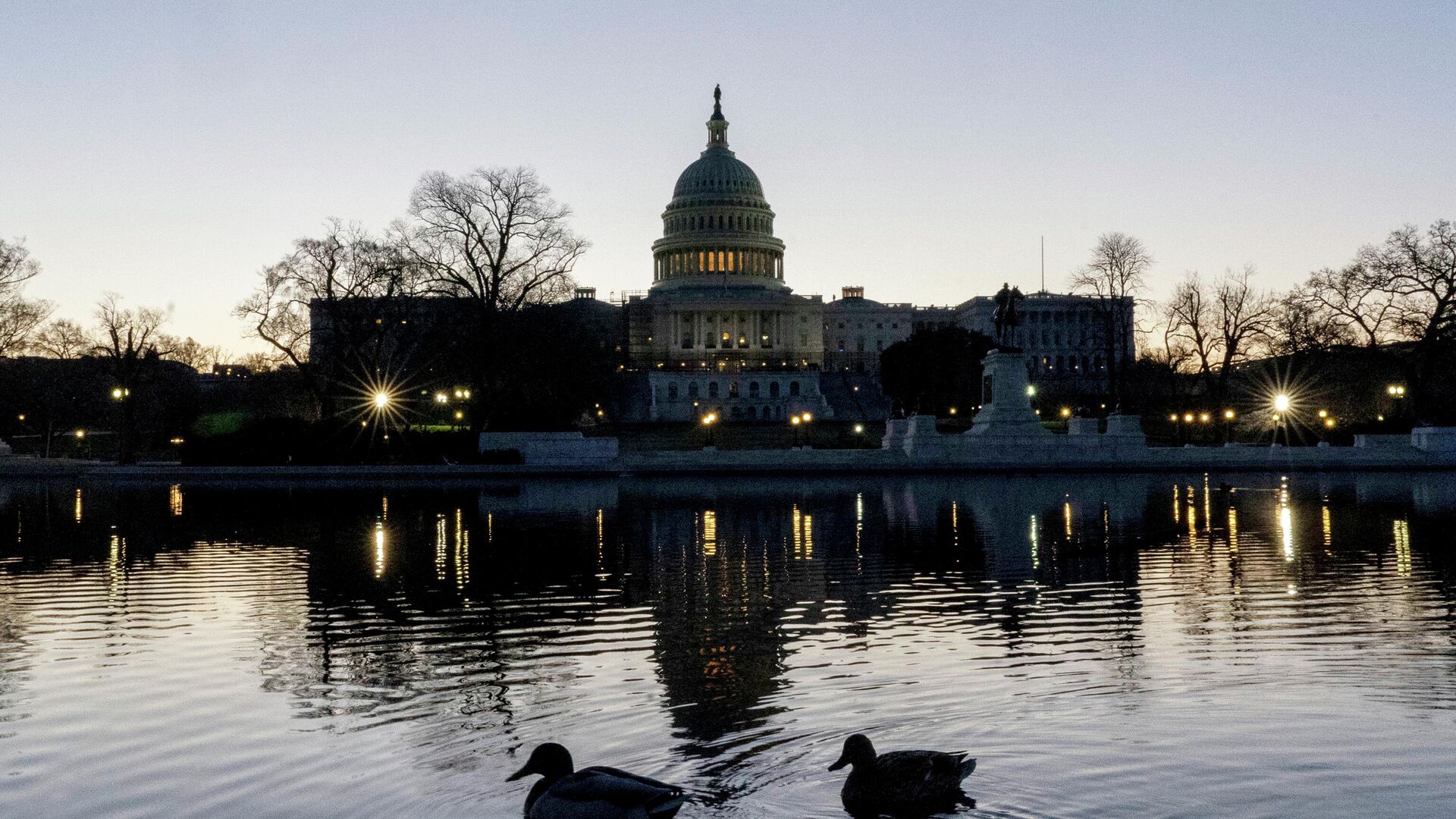https://sputnikglobe.com/20220928/us-electoral-count-reform-preventing-chaos-or-stepping-towards-federalization-1101319358.html
US Electoral Count Reform: Preventing Chaos or Stepping Towards Federalization?
US Electoral Count Reform: Preventing Chaos or Stepping Towards Federalization?
Sputnik International
The Senate’s bill to reform how Congress certifies presidential elections with the aim to reform the Electoral Count Act of 1887 has passed the upper chamber's... 28.09.2022, Sputnik International
2022-09-28T18:09+0000
2022-09-28T18:09+0000
2022-10-19T20:37+0000
analysis
us
ted cruz
2024 us presidential election
donald trump
us election 2020
congress
https://cdn1.img.sputnikglobe.com/img/07e6/04/04/1094483904_0:0:3071:1728_1920x0_80_0_0_e24658a609eb6bd08cd02af51b0deb3d.jpg
Members of the Senate Rules Committee voted 14-1 in favor of sending a new electoral legislation to the upper chamber's floor on September 27. The Electoral Count Reform and Presidential Transition Improvement Act of 2022 was written by Republican Senator Susan Collins from Maine and her Democratic counterpart Joe Manchin from West Virginia.The legislation would considerably raise the threshold for congress members to be able to object to Electoral College votes. It also specifies the vice president’s role in the process as being purely ceremonial, in a bid to prevent the protests akin to the January 6, 2021 Capitol breach. The Capitol protests erupted over alleged instances of election fraud in the 2020 presidential election which saw Joe Biden win by slim majorities in key battleground states. Then-President Donald Trump dubbed the elections rigged and urged then-Vice President Mike Pence to send the results back to the states, thus overturning Biden's victory. However, Pence issued a statement saying that he had no constitutional authority to decertify electoral votes.However, it appears that the current language of the Electoral Count Act of 1887 left room for various interpretations. A legal opinion written in January 2021 by Washington attorney and former Department of Defense Inspector General Joseph Schmitz provided reasoning to suggest that VP Pence had the constitutional authority to object to the certification of electoral votes submitted by a handful of states.The only senator on the Senate Rules Committee who voted against the proposed new legislation was Ted Cruz (R-Texas). According to the lawmaker, the bill "decreases the ability of Congress to address instances of fraud."For his part, Sen. Josh Hawley (R-Mo.) said he will "probably vote no" on the bill: "Fiddling with that law, which has governed out presidential elections for 150 years, I just don’t see a need to do it," Hawley said, as quoted by Axios. Both Cruz and Hawley objected to Joe Biden’s certification in the 2020 election on January 6, 2021.At the same time, however, a number of Republican senators said that they are open to reforms and will carefully examine the legislative initiative. One of them is Sen. Rand Paul (R-Ky.), who noted that the Senate legislation is "more reasonable" than a similar bill passed by the House on September 21 with a vote of 229–203.The competing electoral legislation passed in the House was proposed by Representatives Zoe Lofgren (D-Calif.) and Liz Cheney (R-Wyo.).According to the Cato Institute, the two bills are broadly similar in most respects, but have several differences. For example, the Senate's version would require one-fifth of the House and the Senate to agree to challenge a state’s results, while the House's bill raises the threshold to one-third of the members of the two chambers. For comparison's sake, the current law stipulates that objections could proceed with the support of just one lawmaker from each chamber.According to the Epoch Times, a vote on the Senate bill will take place after the November midterm elections. The media outlet specified that at least 12 republicans have already signaled support for the bill, which means it has every chance of breaking a filibuster in the evenly split upper chamber. Once the bill is passed in the Senate it will have to be reconciled with the House version before it goes to President Joe Biden's desk.
https://sputnikglobe.com/20220922/us-house-oks-overhaul-of-electoral-count-act-in-bid-to-avert-jan-6-repeat--1101067853.html
Sputnik International
feedback@sputniknews.com
+74956456601
MIA „Rossiya Segodnya“
2022
News
en_EN
Sputnik International
feedback@sputniknews.com
+74956456601
MIA „Rossiya Segodnya“
Sputnik International
feedback@sputniknews.com
+74956456601
MIA „Rossiya Segodnya“
us, ted cruz, 2024 us presidential election, donald trump, us election 2020, congress
us, ted cruz, 2024 us presidential election, donald trump, us election 2020, congress
US Electoral Count Reform: Preventing Chaos or Stepping Towards Federalization?
18:09 GMT 28.09.2022 (Updated: 20:37 GMT 19.10.2022) The Senate’s bill to reform how Congress certifies presidential elections with the aim to reform the Electoral Count Act of 1887 has passed the upper chamber's Rules Committee. A competing legislation was passed by the House last week.
Members of the Senate Rules Committee voted 14-1 in favor of sending a new electoral legislation to the upper chamber's floor on September 27. The Electoral Count Reform and Presidential Transition Improvement Act of 2022 was written by Republican Senator Susan Collins from Maine and her Democratic counterpart Joe Manchin from West Virginia.
The legislation would considerably raise the threshold for congress members to be able to object to Electoral College votes. It also specifies the vice president’s role in the process as being purely ceremonial, in a bid to prevent the protests akin to the January 6, 2021 Capitol breach.
The Capitol protests erupted over alleged instances of election fraud in the 2020 presidential election which saw Joe Biden win by slim majorities in key battleground states. Then-President Donald Trump dubbed the elections rigged and urged then-Vice President Mike Pence to send the results back to the states, thus overturning Biden's victory. However, Pence issued a statement saying that he had no constitutional authority to decertify electoral votes.
However, it appears that the current language of the Electoral Count Act of 1887 left room for various interpretations. A legal opinion written in January 2021 by Washington attorney and former Department of Defense Inspector General Joseph Schmitz provided reasoning to suggest
that VP Pence had the constitutional authority to object to the certification of electoral votes submitted by a handful of states.
"Congress’s process for counting the presidential electors’ votes was written 135 years ago," Senate Minority Leader Mitch McConnel said in remarks to the Senate on September 27. "The chaos that came to a head on January 6th of last year certainly underscored the need for an update. So did Januaries 2001, 2005, and 2017; in each of which, Democrats tried to challenge the lawful election of a Republican president."

22 September 2022, 03:04 GMT
The only senator on the Senate Rules Committee who voted against the proposed new legislation was Ted Cruz (R-Texas). According to the lawmaker, the bill "decreases the ability of Congress to address instances of fraud."
For his part, Sen. Josh Hawley (R-Mo.) said he will "probably vote no" on the bill: "Fiddling with that law, which has governed out presidential elections for 150 years, I just don’t see a need to do it," Hawley said, as quoted by Axios. Both Cruz and Hawley objected to Joe Biden’s certification in the 2020 election on January 6, 2021.
For his part, Cruz addressed the Senate, telling it that, "It’s bad policy and it’s bad for democracy. There are serious constitutional questions in the bill (…) [It] takes a significant step down that road of putting the federal government in charge of elections. I don’t believe senators from this side of the aisle should be supporting a bill that enhances the federalization of elections and reduces the ability of Congress to respond to the very serious problem of voter fraud. I think this bill does that, and so I intend to oppose it."
At the same time, however, a number of Republican senators said that they are open to reforms and will carefully examine the legislative initiative. One of them is Sen. Rand Paul (R-Ky.), who noted that the Senate legislation is "more reasonable" than a similar bill passed by the House on September 21 with a vote of 229–203.
The
competing electoral legislation passed in the House was proposed by Representatives Zoe Lofgren (D-Calif.) and Liz Cheney (R-Wyo.).
According to the Cato Institute, the two bills are broadly similar in most respects, but have several differences. For example, the Senate's version would require one-fifth of the House and the Senate to agree to challenge a state’s results, while the House's bill raises the threshold to one-third of the members of the two chambers. For comparison's sake, the current law stipulates that objections could proceed with the support of just one lawmaker from each chamber.
According to the Epoch Times, a vote on the Senate bill will take place after the November midterm elections. The media outlet specified that at least 12 republicans have already signaled support for the bill, which means it has every chance of breaking a filibuster in the evenly split upper chamber. Once the bill is passed in the Senate it will have to be reconciled with the House version before it goes to President Joe Biden's desk.



